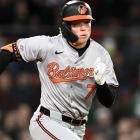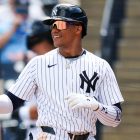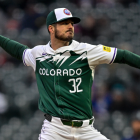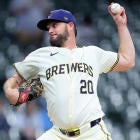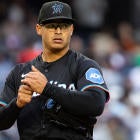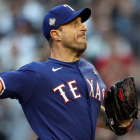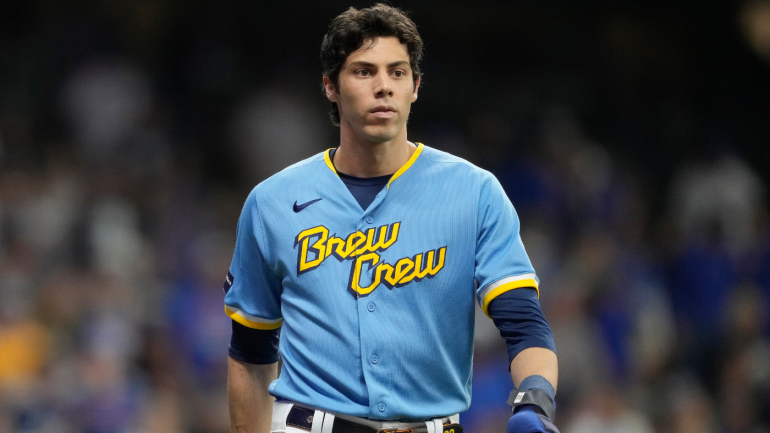
The Milwaukee Brewers continued a transformative offseason on Thursday night, shipping ace Corbin Burnes to the Baltimore Orioles in exchange for infielder Joey Ortiz, left-handed DL Hall, and a draft pick. Burnes joins fellow right-hander Brandon Woodruff, top executive David Stearns, and manager Craig Counsell as notable members of the organization to depart this winter.
The Brewers, who captured the National League Central crown last season with a 92-70 record, have made waves for other reasons, too. They recently signed veteran first baseman Rhys Hoskins, and earlier this offseason they agreed to a long-term extension with outfielder Jackson Chourio before his debut.
Add it all together and it's fair to write that the Brewers are going to look considerably different from the last time we saw them come Opening Day, when they take on the New York Mets on the road to kick off the season.
There's still some offseason left to burn between now and then, however, so it's worth asking: just what comes next for the Brewers? Below we've addressed three big questions facing Milwaukee over the next seven weeks.
1. Are more moves coming?
It's weird to think about given that spring training is a matter of weeks away, but the Burnes trade feels like the first in a series of dominoes. Put another way: if the Brewers were willing to move their ace ahead of his walk year, then there's not much preventing them from moving shortstop Willy Adames -- particularly in light of them gaining Ortiz, a well-regarded shortstop prospect.
Adames, 28, is also entering his final year of team control. He's coming off a relatively down season, during which he posted a career-worst OPS+. Adames still produced three Wins Above Replacement, running his three-year total to 11.6. Dansby Swanson, for comparison, notched 10.6 WAR in his final three seasons with the Atlanta Braves before signing a seven-year pact worth $177 million. Swanson's WAR total was suppressed by the pandemic-shortened 2020 season, but barring a miserable effort this year it stands to reason that Adames is going to get paid more than the Brewers would be willing to offer.
The free-agent and trade markets for shortstops have been brutal this offseason, meaning there are plenty of teams -- including, presumably, the Los Angeles Dodgers -- who would love to add Adames to their lineup.
Freddy Peralta, 97mph ⛽️
— Rob Friedman (@PitchingNinja) August 13, 2023
6th K pic.twitter.com/eFKbcoGx7J
Interestingly, a source with a different front office predicted that Adames will not be the next Brewers player traded. Rather, they said to keep an eye on right-hander Freddy Peralta, an above-average starter with up to three years of control remaining thanks to the long-term deal he signed in 2020.
If the Brewers do move Peralta, they'll have potentially lost three pitchers who have combined for 235 starts since the 2021 season. Speaking of ….
2. Who starts?
As we noted in the first subheading, it's possible the Brewers enter the 2024 season without three core members of their recent rotations. Milwaukee was active on the free-agent market in preparation for this possibility. The Brewers retained Colin Rea and Wade Miley (both league-average or better performers for Milwaukee last season), as well as adding veteran Joe Ross, who hasn't pitched in the majors since 2021 because of Tommy John surgery.
While those three each could end up being serviceable again, Brewers fans can be forgiven if they're more interested in how Milwaukee fares with some of the younger arms coming through the system -- specifically the newly obtained DL Hall, Robert Gasser, and Jacob Misiorowski.
Hall, 25, may be the first in line to get a look. He has two quality pitches, in his fastball and slider, and he's struck out 29% of the batters he's faced in 33 big-league innings to date. The catch with Hall is his command. His fastball benefits from his lower, deeper release point, but his location tends to suffer as he's been unable to consistently time his long arm action. He's walked more than five batters per nine for his professional career, and the Orioles in turn used him almost exclusively as a reliever at the game's highest level.
DL Hall, K'ing the Side. 🔥 pic.twitter.com/1vFygzpzjq
— Rob Friedman (@PitchingNinja) August 13, 2022
Gasser, 24, was part of the return on Josh Hader at the 2022 deadline. He doesn't have Hall's high-end stuff, but he posted a 3.79 ERA and a 3.32 strikeout-to-walk ratio last season in 26 Triple-A appearances. Gasser too pitches from a lower release point. He has a full arsenal, including a low-90s fastball, an upper-80s cutter, and three breaking balls (curve, slider, sweeper).
Misiorowski, 21, was a second-round pick in 2022. He's barely pitched since, amassing just 73 innings, yet he stands out as one of the biggest risk-reward starting prospects in the minors. Misiorowski has explosive stuff in the form of his fastball and slider combination, and his operation might remind you a bit of Tanner Houck. As with Hall, he's proven too willing to give up a base. Thus far, he's surrendered six walks per nine innings.
The Brewers' player development staff, including vice president Cameron Castro, has received praise from some of our sources. They'll have their hands full trying to convert Hall and Misiorowski into legitimate big-league starters. If they can pull it off, though, the Brewers might already have heirs to Burnes, Woodruff, and Peralta in hand.
3. Could Yelich move?
We feel obligated to note that, elsewhere on the Brewers depth chart, they have a logjam in the outfield.
The Brewers liked Chourio enough to guarantee him $82 million before he'd taken a swing in a MLB game. He ranked No. 7 on our most recent prospect list thanks to his dynamic power-speed combination and center-field defense. Some talent evaluators have expressed concerns about his approach, and that's certainly fair at this stage in his development, but he won't celebrate his 20th birthday until March and there's legitimate superstar upside here.
In addition to Chourio, the Brewers have a pair of recent first-round picks, in Garrett Mitchell and Sal Frelick, and second-year outfielder Joey Wiemer to throw out there. There's also Christian Yelich, who suddenly feels of a different time and place in Milwaukee. You would be within reason to wonder, then, about the chances of him being on the trading block.
Yelich, 32, is coming off his best season since nearly winning his second consecutive NL Most Valuable Player Award in 2019. He hit .278/.370/.447 (124 OPS+) with 19 home runs and 3.6 Wins Above Replacement. Those aren't the peaks he hit earlier in his Brewers career, but they make him a valuable contributor, albeit one who could spend most of his time this season at DH.
Of course, the same reason the Brewers might want to move Yelich at some point over the coming years -- the $136.5 million owed to him over the next five-plus seasons -- is the same reason that other teams would be reluctant to trade much of value for him. (Besides, Yelich has full no-trade protection as well, meaning he would have to be on board with a deal for it to go down.)
Anything can happen in baseball, but for the time being, we suspect Yelich will remain one of the last major remnants of the Stearns era in Milwaukee.

















